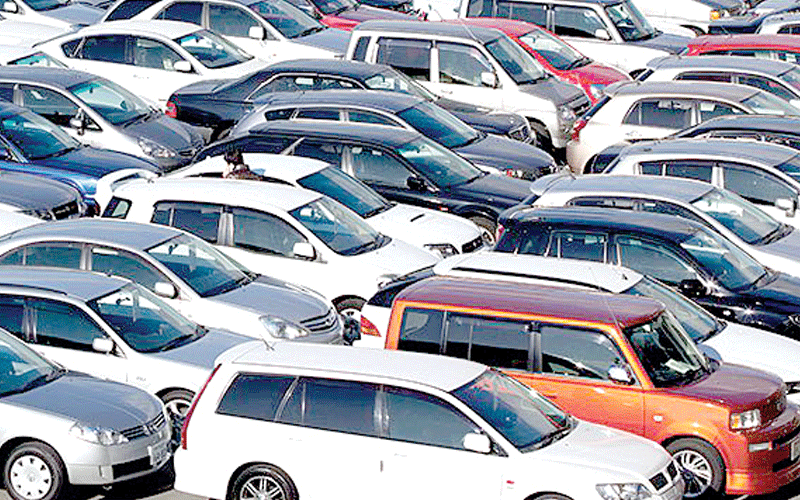Experts want used vehicles import business regulated

Evelyn Makena @evemake_g
Along Nairobi’s Ngong Road, thousands of cars gleam under the morning light waiting for potential buyers.
Parked strategically along the busy road, scores of vehicles that come in varied models are among dozens of second-hand cars imported into the country every year.
Imported mainly from Japan, used vehicles, currently accounting for 95 per cent of the fleet added to the market, offer an affordable path to car ownership.
But the ease in acquiring vehicles for Kenyans has come at a cost. The fast growing fleet is contributing to air pollution and emission of gases that cause climate change according to a newly released UNEP report.
The report faults weak regulations among importers and exporters for leading trade of low quality used cars that risks human health and the environment.
This gap has led to dumping of old, unsafe and un-roadworthy vehicles in Africa.
According to the report, 14 million used light duty vehicles were exported between 2015-2018, with more than half ending in Africa.
Safety and environmental features in most of them are damaged or removed by the time they arrive into the importing countries.
“Most developing markets import cars unfit for use in exporting countries. Such vehicles pose a danger to road safety and have low efficiency,” says Inger Andersen, Executive Director, UNEP.
The report also points out that few developing countries have regulations governing safety and quality of used vehicles.
Similarly, in many African countries existing rules that come in form of labelling, fiscal incentives and age restrictions are poorly enforced.
Two thirds of the 146 countries studied in the report have weak or very weak policies regulating such imports.
Kenya has an age limit for used vehicle imports of eight years. For this reason, four in every five vehicles imported are aged seven-eight years old from date of manufacture.
This restriction has resulted a relatively younger and cleaner fleet as compared to other African countries such as Rwanda and Uganda.
The fuel consumption and carbon emissions from used cars in Kenya is 25 per cent less compared to Rwanda, where there is no age limit, and Uganda that has an age limit of 15 years.
Affordability is one of the reasons many Kenyans opt to buy used cars.
“Few people can afford to buy a brand new car; buying a used vehicle is a cheaper option.
Besides, it is a good source of revenue for the government in form of taxes because if only new cars were allowed few people could afford them,” notes Steve Mbuthi, a motoring enthusiast.
An imported road motor vehicle costs on average Sh913,000 in 2019 according to Economic Survey, 2020.
Last year, Kenya adopted Euro 4 vehicle emission standards for new and used imported and locally assembled vehicles.
Under these standards, vehicles are fitted with filters to reduce level of particulate matter and nitrogen oxides emitted.
However, industry stakeholders are deliberating on modalities of implementing them.
The Kenyan Bureau of statistics requires that all imported vehicles go through a pre-export verification and safety checks that cover steering control, tyre condition, electrical wiring, lighting systems, braking system, suspension system among others.
Kebs has pre-approved several companies to carry out checks on all cars shipped to Kenya.
A certificate of roadworthiness valid for six months is issued once the vehicle has been confirmed compliant.
Zero emission
Vehicle emissions are a big source of particulate matter and nitrogen oxides that cause urban air pollution.
Air pollution is a major threat to health and causes seven million deaths worldwide every year according to World Health Organisation.
Additionally, used vehicles of poor quality lead to road accidents that kill 1.25 million people every year.
Africa accounts for most road accident fatalities at 246,000 deaths every year.
Countries with strict regulations on used vehicle imports attract cleaner and more efficient vehicles and have a better opportunity to transition to zero emission fleets according to Jane Akumu, Africa Focal at UNEP, promoting cleaner mobility programmes.
“Egypt for example banned import of used vehicles, but has modified the ban to allow import of used electric vehicles,” she says.
There has been an increase in the number of electric vehicles imported in Egypt since the country allowed import of vehicles less than three years in 2018.” she says.
UNEP is calling for harmonisation of minimal quality standards to reduce import of old used vehicles with high emissions.
“We are not calling for a complete ban because there is still market for them.
We are working towards regulation of the trade by the countries involved to ensure mobility in a safe way,” says Inger.










